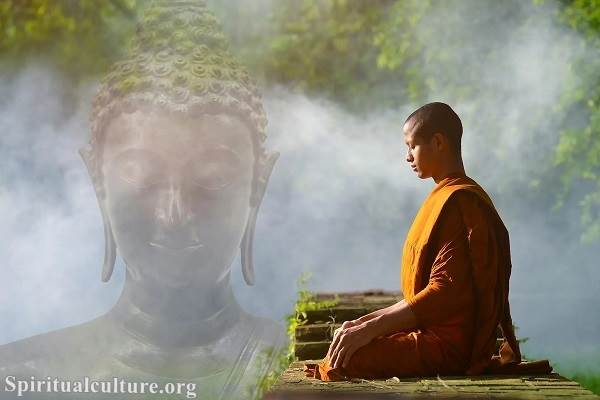Buddhism, one of the world’s major religions, occupies a unique position in the religious landscape, often blurring the lines between theism and atheism.
This question is not as straightforward as it might seem, as Buddhism’s perspective on divinity is quite different from that of monotheistic religions like Christianity, Islam, or Judaism.
Buddhists
Buddhists follow the teachings of Siddhartha Gautama, known as Buddha, who lived in the 5th century BCE in what is now Nepal and India. Buddha was not considered a god, but rather an enlightened being who achieved Nirvana – the state of liberation from the cycle of birth, death, and rebirth, known as Samsara. He taught a path of moral conduct, meditation, and wisdom, which, if followed, could lead others to achieve the same state of enlightenment.
The Concept of God in Buddhism
Asking “Do Buddhists believe in god?” requires understanding the Buddhist concept of divinity, which is significantly different from Western religious traditions. Buddhism is non-theistic, meaning it does not promote belief in a personal, creator god. Instead, it focuses on the quest for spiritual enlightenment.

Buddhism acknowledges the existence of powerful beings called devas, which are often mistaken for gods. However, these beings are not worshipped or considered all-powerful or eternal. They are subject to the same cycle of birth, death, and rebirth as all other sentient beings and are not creators of the universe or arbiters of human morality.
Buddhists believe that the path to enlightenment relies on individual effort, not divine intervention. They strive to follow the Eightfold Path taught by the Buddha, which includes right understanding, right thought, right speech, right action, right livelihood, right effort, right mindfulness, and right concentration.
Buddhism and the Question of God
The question, “Do Buddhists believe in god?” often arises because Buddhism does not fit neatly into categories of theistic or atheistic. While Buddhism does not affirm the existence of a creator god, it also does not deny the existence of divine or supernatural beings.
Buddhists do believe in a kind of divine reality, often referred to as the Dharma. The Dharma is the law that governs the universe, a kind of ultimate truth or reality that transcends the physical world. But the Dharma is not a god in the sense of a personal, intervening deity.
Ultimately, the focus of Buddhism is not on worshiping gods or seeking their favor, but on achieving enlightenment through understanding the nature of reality and living a moral and compassionate life.
In Conclusion
So, do Buddhists believe in god? The answer is complex and depends on one’s definition of “god.” If by “god” one means a personal, creator deity who intervenes in the world, then the answer is no. But if by “god” one means a higher power or ultimate reality, then the answer is yes, in the sense that Buddhists believe in the Dharma.
Buddhism offers a unique perspective on divinity, focusing more on the path to enlightenment and moral living than on the worship of deities. The goal of Buddhism is not to seek favor from gods, but to attain wisdom, ethical conduct, and mental discipline, leading to the ultimate liberation from suffering.
Therefore, the question “Do Buddhists believe in god?” might be better rephrased as “What do Buddhists believe?” The answer is that Buddhists believe in the teachings of the Buddha, the pursuit of enlightenment, and the practice of compassion and moral living.


